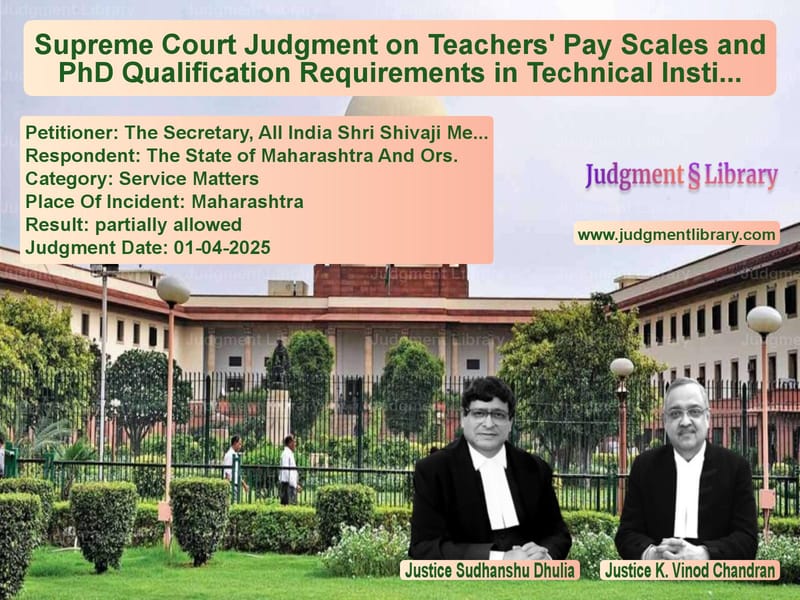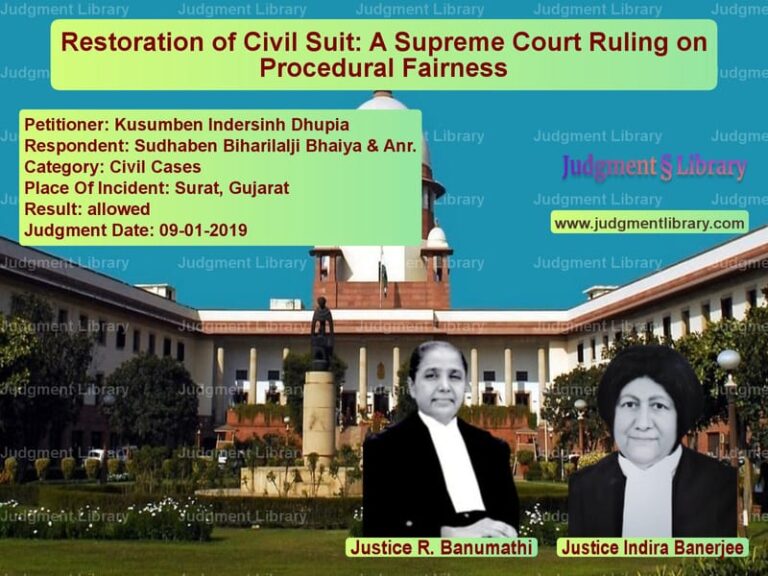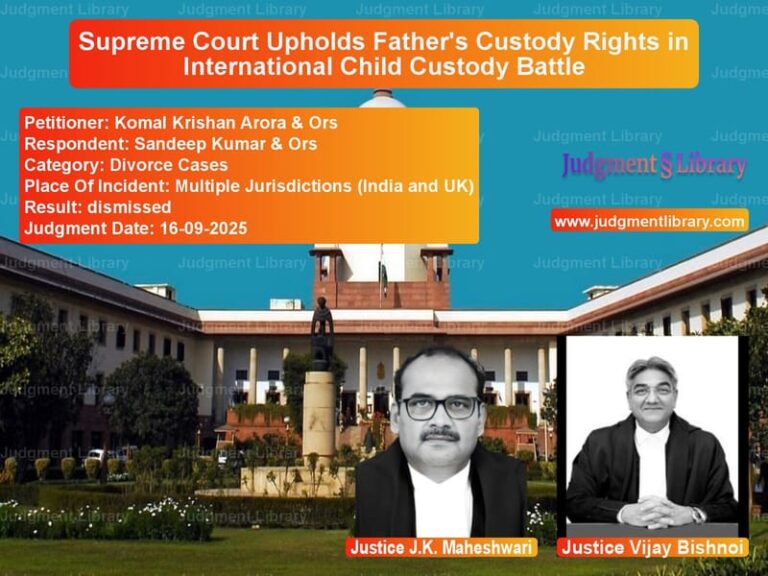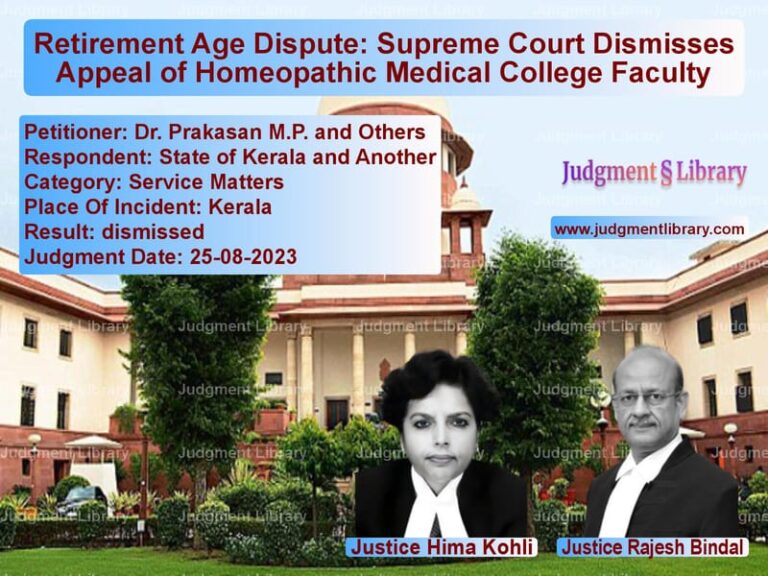Supreme Court Judgment on Teachers’ Pay Scales and PhD Qualification Requirements in Technical Institutes
In a significant ruling affecting technical education institutes across India, the Supreme Court recently delivered its judgment in the case between The Secretary, All India Shri Shivaji Memorial Society (AISSMS) and The State of Maharashtra & Ors. The case revolved around the entitlement of teachers to higher pay scales and redesignation as Associate Professors under the 6th Central Pay Commission recommendations, particularly focusing on the mandatory PhD qualification requirement.
Case Background
The dispute originated when teachers from engineering and technical institutes run by AISSMS, a private society, approached the Bombay High Court seeking benefits of revised pay scales under the 6th Pay Commission and redesignation as Associate Professors. The High Court ruled in favor of the teachers, directing the appellant-Society to extend these benefits. The Society then appealed to the Supreme Court against this decision.
Key Facts of the Case
- The respondent-teachers were appointed between 1995 and 2009 as Lecturers/Assistant Professors
- Most failed to acquire PhD degrees within seven years of appointment as required
- AICTE notifications made PhD mandatory for Assistant Professors from 15.03.2000
- Teachers sought higher pay scale and redesignation as Associate Professors under 2010 AICTE notification
- The Society denied benefits citing lack of mandatory PhD qualification
Petitioner’s Arguments (AISSMS)
“Mr. Ravindra Shrivastava, learned senior counsel appearing for the petitioners submits that the present case is not covered in terms of the decision in Sanjay Shrirangrao Surwase & Ors. v. State of Maharashtra & Ors. rendered in Writ Petition No. 6001/2013 on the file of the Division Bench of the High Court of Bombay at Aurangabad. One main distinction pointed out is that, it was a case of qualified teachers whereas in this case the teachers are not qualified as per A.I.C.T.E. and not entitled to the benefit of designation and consequent benefit of Sixth Pay Commission.”
Respondents’ Arguments (Teachers)
“The learned Counsel for the private respondents Sri Abhay Atul Anturkar would, however, argue that the powers vested with AICTE were statutory in nature under Section 23 of the 1987 Act… The learned Counsel for the respondents then relies upon the judgment of this Court in Christy James Jose and Ors v. State of Kerala and Ors 2016 SCC Online SC 1817 and would argue that the AICTE clarification of 04.01.2016 has a statutory status, and in terms of the same, the only consequence of non-completion of Ph.D. within seven years would be the stoppage of increments.”
Court’s Analysis and Decision
The Supreme Court made several key observations in its judgment:
1. On AICTE’s Authority
“AICTE which is an expert body mandated by law, inter alia, to prescribe essential qualifications for a teaching post, and hence we cannot question the logic and wisdom of this expert body which prescribes the essential qualifications for these posts.”
2. On PhD Requirement
“The phrase ‘incumbent Assistant Professor’ in the 2010 notification, to our mind, would only include such Assistant Professors working on the post who had a Ph.D. qualification at the time of their appointment or who though did not have a Ph.D. qualification at the time of their appointment but subsequently in terms of the notification dated 15.03.2000 read with subsequent notification dated 28.11.2005 acquired Ph.D. within seven years of their appointment or those appointed prior to 15.03.2000.”
3. On Judicial Review of Expert Bodies
“The courts are neither equipped nor have the academic or technical background to substitute themselves in place of statutory professional technical bodies and take decisions in academic matters involving standards and quality of technical education… The role of statutory expert bodies on education and the role of courts are well defined by a simple rule. If it is a question of educational policy or an issue involving academic matter, the courts keep their hands off.”
Final Judgment
The Supreme Court partially allowed the appeal with the following directions:
- Teachers appointed before 15.03.2000 (when PhD wasn’t mandatory) to receive higher pay scale with 7.5% interest on arrears
- One teacher who acquired PhD after appointment to also receive benefits
- Teachers appointed after 15.03.2000 without PhD not entitled to higher pay scale or redesignation
- Teachers can reapply for benefits if they acquire PhD later
Broader Implications
This judgment has significant implications for:
- Technical education institutes across India
- Teachers’ qualification requirements and career progression
- Implementation of AICTE regulations
- Pay scale structures in private technical institutes
The ruling reinforces the authority of expert bodies like AICTE in setting academic standards while balancing the rights of teachers who were appointed under different qualification regimes.
Petitioner Name: The Secretary, All India Shri Shivaji Memorial Society (AISSMS) And Ors..Respondent Name: The State of Maharashtra And Ors..Judgment By: Justice Sudhanshu Dhulia, Justice K. Vinod Chandran.Place Of Incident: Maharashtra.Judgment Date: 01-04-2025.
Don’t miss out on the full details! Download the complete judgment in PDF format below and gain valuable insights instantly!
Download Judgment: the-secretary,-all-i-vs-the-state-of-maharas-supreme-court-of-india-judgment-dated-01-04-2025.pdf
Directly Download Judgment: Directly download this Judgment
See all petitions in Employment Disputes
See all petitions in Promotion Cases
See all petitions in Public Sector Employees
See all petitions in Judgment by Sudhanshu Dhulia
See all petitions in Judgment by K. Vinod Chandran
See all petitions in partially allowed
See all petitions in supreme court of India judgments April 2025
See all petitions in 2025 judgments
See all posts in Service Matters Category
See all allowed petitions in Service Matters Category
See all Dismissed petitions in Service Matters Category
See all partially allowed petitions in Service Matters Category







